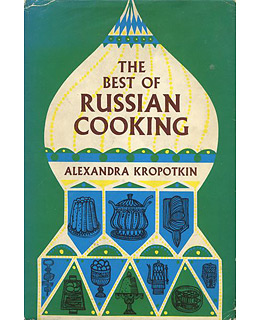
I like to read old cookbooks—a guilty pleasure because I don't cook. Instead, I enjoy them as travelogues, works of cultural history and even as psychobiographies of their creators. And I fantasize about all the wonderful, exotic meals I might eat if I did cook.
They come in many subgenres, written by a wildly varied crew—from the Junior League ladies of Charleston, S.C. (Charleston Receipts, 1950) to the Hungarian-born Hollywood producer of Where the Boys Are (Cooking with Love and Paprika by Joseph Pasternak, 1966—how I'd love to sample his stuffed sirloin steak). But three are my hands-down favorites. How to Cook and Eat in Russian by Princess Alexandra Kropotkin (published in 1947 and later republished as The Best of Russian Cooking) is one of the best books on Russia ever published. Writing in forceful, urbane English, the princess (daughter of exiled anarchist Peter Kropotkin) describes in astonishing detail her native food, cooking and entertaining, including why your serving girl will want to sleep on top of your stove. She gives authoritative recipes, not just for the famous dishes like beef Stroganoff (no tomato paste, please!), but also for such delights as spring chicken with gooseberry sauce.
Eleanor Early, author of New England Cookbook (1954), was a fearless Yankee dame, unashamed to take home the chicken carcass (for making stock) from a neighbor's dinner party. She offers a marvelous account of her region's specialties and curiosities, from heavenly haddock to Vermont chicken pie to perfect fried oysters (pan-fried for 12 minutes), to fish balls, as made at Boston's Hotel Ritz.
Ann Rogers' A Cookbook for Poor Poets and Others (1966) represents the zenith of Northern California bohemianism before it exploded into hippiedom (and health food). The author, a history teacher at Tamalpais High School in Mill Valley, nurses a charming conceit to feed struggling artists and writers on a budget, even after "one day there is not a rejection slip nor the refusal of a job, but a check. A small check ..." Her recipes are a lovely, international hodgepodge of what an arty hostess might serve in the period, for instance, fahsoulia beytha watefah—spiced lentils that "came back from Egypt, along with a water buffalo hassock and a pile of floor cushions."
Stumpf's most recent book is Confessions of a Wall Street Shoeshine Boy.